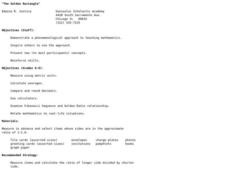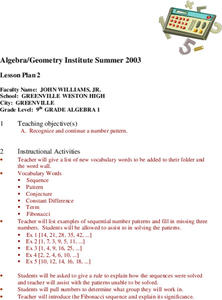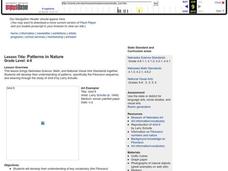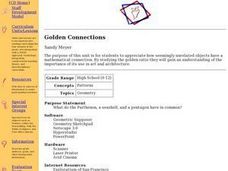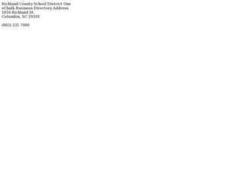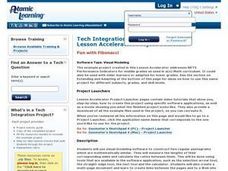Curated OER
The Golden Rectangle
Students explore the concept of the golden ratio. In this golden ratio lesson, students measure objects to determine if their measurements fit the golden ratio. Students calculate the average measurements of the class.
Curated OER
Leonardo of Pisa and the Golden Rectangle
Students investigate geometry and algebra and the history behind these two interesting subjects. In this algebra instructional activity, students analyze the Fibonacci Sequence and relate it to solving exponential equations. There are...
Curated OER
As Good As Gold
Learners find examples of the Golden Ratio on the human body through measurement. Additionally, students learn about the use of the Golden Ratio and the Golden Rectangle in art and architecture. A very interesting lesson for the learners!
K20 LEARN
Are We Golden?
Lead your class on a search for precious bones. Using a presentation, the class investigates the golden ratio in art and nature. Groups of pupils measure specific bones and find the average ratio for the class. To further cement the...
Curated OER
Patterns and Sequences
Ninth graders examine sequential number patterns and the Fibonacci sequence. Given number patterns, they determine the next number in a sequence. Students develop their own number patterns and exchange them with another to be solved.
Curated OER
Guess That Sequence!
Students analyze number sense by participating in a pattern identification activity. In this number sequence lesson, students examine several groups of numbers and identify the sequence in the group before adding on to it. Students check...
Curated OER
Rhythm Lessons Show The Link Between Music And Math
Educators can use music lessons that show students how to learn about rhythm in a fun and exciting way.
Curated OER
Fibonacci Sequences Icebreaker
Students explore Fibonacci sequences. In this math lesson, students identify the relationship between two numbers. Students use Fibonacci sequences to create algebraic equations.
Curated OER
Where Math Meets Poetry
Students identify Fibonacci's sequence of numbers and use the pattern to write poetry with one syllable words. In this math and writing lesson, students identify Fibonacci's sequence of numbers and learn about this early mathematician....
Curated OER
Patterns in Nature
Students learn about artist Larry Schulte and view examples of his work. They create addition sentence for the first seven numbers of the fibonacci sequence and use unifix cubes to build that sentences. Students color and create three...
Curated OER
Perfection on Ice!: Math, Geometry, Fibonacci Numbers, Olympics
Pupils use the human body as a foundation for gaining practice in measuring angles and calculating ratios and proportions.
Curated OER
Golden Connections
Students determine the ratio of pairs of consecutive terms in the Fibonacci Sequence. Using four different colors, they create a golden rectangle in either two or three dimensions. They use photographs to create two collages using...
Curated OER
How Many Cells Are Born in a Day?
Learners predict the number of cells after a series of cell divisions. For this cells lesson students create a graph of their results and create a patterned drawing.
Curated OER
Perplexing Patterns
Seventh graders identify and find missing patterns. In this algebra lesson, 7th graders investigate numbers and sequences and complete the pattern. They make a chart and discuss similarities and differences.
Curated OER
Patterns and Sequences
Sixth graders explore pattern recognition and sequencing. They create arithmetic and geometric sequences with colors, shapes, and numbers. Students write expressions of arithmetic sequences and geometric sequences to find the nth term.
Curated OER
The Function Box
Students explore arithmetic and numerical patterns. After observing a teacher created function box, students describe a pattern and predict what will "come out" of the function box. They explore patterns such as geometric shapes,...
Curated OER
Badminton or Basketball?
Students explain why for a group of n people, there are an equal number of possibilities for subgroups of size k (such that k < n) and size n - k.
Curated OER
Design, Grow, and Ponder in a Garden
A garden can inspire students to make mathematical connections.
Curated OER
Modeling pentagrams using Geometers Sketchpad
Students using visual modeling software will construct two regular pentagrams which are mathematically similar. They also create a multi-page document and learn to create links between the pages and to a website on the History of...
Curated OER
What's My Function?
Fifth graders utilize input/output tables to help them solve algebraic equations. They incorporate patterns, number sequences and relations to represent and analyze mathematical problems and number relationships using algebraic symbols.
Mathigon
Mathigon: Algebra: Fibonacci Numbers
This lesson focuses on Fibonacci numbers, a pattern based on the sum of the two previous numbers. It offers examples and practice exercises using some form of Fibonacci numbers.
PBS
Pbs: Jazz and Math: The Fibonacci Keyboard
Teach a lesson about the piano keyboard using the Fibonacci Sequence. Explore with your students the various relationships the Fibonacci Sequence has with music.
Discovery Education
Discovery Education: Numbers in Nature
This Fibonacci sequence lesson plan is aimed at grades 9-12, but would be appropriate for some junior high classes. It includes historical background and examples of Fibonacci numbers in nature, as well as suggested readings and ties to...
Texas Instruments
Texas Instruments: Numb3 Rs: It All Started With a Pair of Rabbits
Based off of the hit television show NUMB3RS, this lesson introduces students to the set of Fibonacci numbers and shows how this set is present in many aspects of nature. Through the lesson, students explore the first 13 elements in the...


